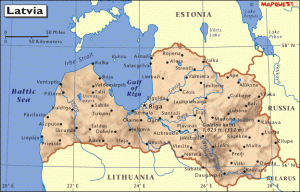Case Preview: Patmalniece v Secretary of State for Work and Pensions
03 Friday Dec 2010
Christopher Brown, Matrix Case Previews
Share it
 This appeal from a decision of the Court of Appeal on 25 June 2009 ([2009] EWCA Civ 621) concerns the concept of direct discrimination under EU law, particularly in the area of “social assistance” under Regulation 1408/71, which coordinates national social security schemes insofar as they apply to workers and their families moving within the EU.
This appeal from a decision of the Court of Appeal on 25 June 2009 ([2009] EWCA Civ 621) concerns the concept of direct discrimination under EU law, particularly in the area of “social assistance” under Regulation 1408/71, which coordinates national social security schemes insofar as they apply to workers and their families moving within the EU.
Mrs Patmalniece came to the UK in 2000 from Latvia, where she had worked for over 40 years and where she was receiving a state pension. Upon arrival she claimed asylum on the basis that her Russian origin would lead to persecution were she to return to Latvia. By January 2004 her attempts to obtain refugee status failed. She did not return to Latvia, however. She was destitute but for her £50 a month state pension.
Shortly after, in May 2004, Lativa acceded to the EU. Mrs Patmalniece then applied for State Pension Credit. Her claim was refused on the basis that she had no right to reside (and so was not “habitually resident” in the UK, which was a condition of entitlement to the Credit): she is no longer a worker, was not self-employed, was not self-sufficient and nor was she a family member of such a person.
Given that all UK nationals have the right of abode in the UK under s 2(1) of the Immigration Act 1971, one question was (and remains) whether Mrs Patmalniece was discriminated against directly on nationality grounds, contrary to Article 3 of Regulation 1408/71, or whether the discrimination was indirect, which although prima facie contrary to Article 3 would allow the Secretary of State to advance a justification based on the protection of the public finances of the host state, there being (in the Secretary of State’s submission) no duty to afford access to social assistance to those who have no right of residence.
In the Court of Appeal, Moses LJ, with whom Lord Clarke of Stone-cum-Ebony MR and Sullivan LJ agreed, concluded that the discrimination was indirect rather than direct. He said that the conditions for entitlement to State Pension Credit were not overtly based on the nationality of the claimant: the fact that nationals of other Member States may qualify precluded such a conclusion ([24]).
The Court also accepted the Secretary of State’s submissions that the indirect discrimination was based on considerations independent of nationality and were proportionate to a legitimate aim, namely that of protecting the resources of the UK. Moses LJ held that the classification of State Pension Credit as a special non-contributory benefit (and therefore as falling within Article 10a(1) of Regulation 1408/71) did not preclude reliance on that justification, which is also relevant to social assistance benefits (which themselves fall outwith the scope of Regulation 1408/71 by virtue of Article 4(4) thereof). In his judgment, the fact that State Pension Credit was a “hybrid” benefit, sharing certain features of social security, did not trigger any entitlement to ‘export’ those benefits or indeed any entitlement whatever, and did not preclude reliance on the justification set out above.
The Supreme Court now has the opportunity to consider these difficult EU law issues, some of which arose in a similar context in Abdirahman v SoS for Work and Pensions [2008] 1 WLR 254 and Kaczmarek v SoS for Work and Pensions [2008] EWCA Civ 1310. In all three cases pension credits were claimed and in all three the Court of Appeal held that the refusal to grant them was justified on the ground of protecting public finances: the difference in Patmalniece is that the applicant relied on the prohibition on nationality discrimination in Article 3 of Regulation 1408/71 rather than merely on the general prohibition contained in ex Article 12 EC (now Article 18 TFEU).
Generally, EU law does not recognise justifications based on economic grounds save where recognition of an EU law right would seriously risk undermining the financial balance of the social security system: see e.g. Case C-120/95 Decker [1998] ECR I-1831. Here, however, the benefit is not one which is claimed in connection with the exercise of free movement of worker rights, and it is clear that the “right to reside” test was included squarely to prevent “benefit tourism”. Is that enough to put the benefit in a separate category? We shall soon find out.


